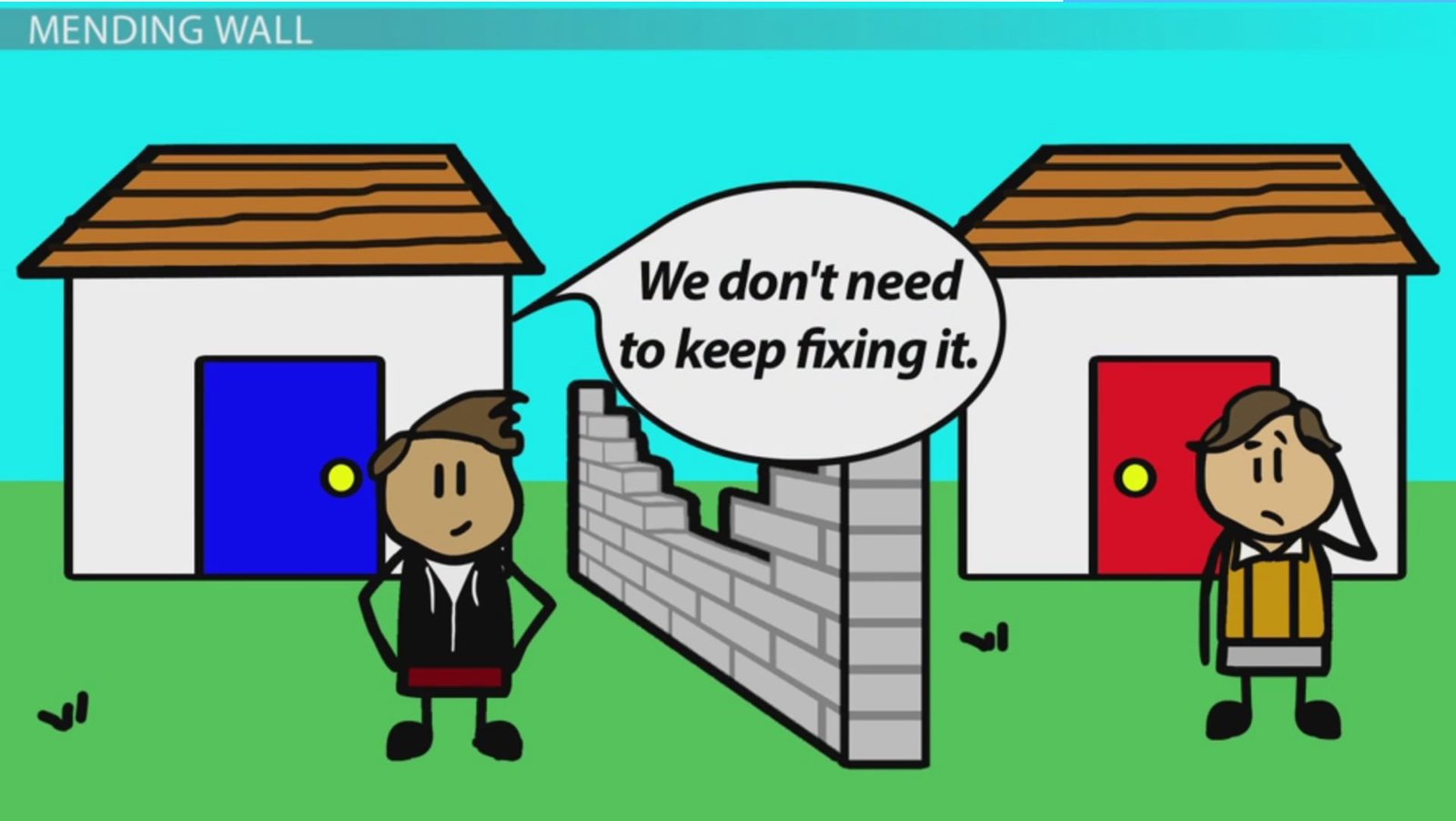By Robert Frost
Ahmed Naveed
“Mending Wall” is a poem by the American poet Robert Frost as the first entry in Frost’s second book of poetry, North of Boston. The verse refers to a pastoral New England, where Frost lived at the time and took its momentum from the rhythms and rituals of life there. The poem conveys how the speaker and a neighbour meet to rebuild a stone wall between their properties—a practice repeated every spring. This ritual raises critical questions throughout the poem as the speaker believes in the purpose of borders between people and the value of human work.
The summary of the poem explains as follows:
Some force doesn’t like walls. It causes the frozen ground to swell underneath a wall, and the wall’s upper stones then topple off in the sun’s warmth. It creates gaps in the wall so big that two people can walk through them side by side. And then there are the hunters who take apart the wall—that’s something different. I often have to come and fix the spots where hunters haven’t left a single stone in place as they try to flush out the rabbits hiding in the wall to make their barking dogs happy. No one has seen or heard these gaps in the wall being made. We find them there in the spring when it comes time to fix the wall. I reach out to my neighbour, who lives over the hill, and we find a day to get together and walk along the border, fixing these gaps as we go. He walks on his side of the wall and I on mine, and we deal only with whatever rocks have fallen off the wall. Some look like loaves of bread, and some are round like balls, so we pray they’ll stay in place, balanced on top of the wall, saying: “Don’t move until we’re gone!” Our fingers get chafed from picking up the rocks. It’s just another outside activity, each of us on our side of the wall, nothing more.
There’s no need for a wall to be there. There are pine trees on my neighbour’s side of the wall; my side is an apple orchard. It’s not like my apple trees are going to cross the wall and eat his pine cones, I say to him. But he responds, “Good fences are necessary to have good neighbours.” Since it’s spring and I feel mischievous, I wonder if I could make my neighbour ask himself: “Why are they necessary? Isn’t that only true if you’re trying to keep your neighbour’s cows out of your fields? There aren’t any cows here. If I were to build a wall, I’d want to know what I was keeping in and what I was keeping out, and who would be offended by this. Some force doesn’t love a wall that wants to pull it down.” I could propose that Elves are responsible for the gaps in the wall, but it’s not precisely Elves, and, anyway, I want my neighbour to figure it out on his own. I see him lifting stones, grasping them firmly by the top, in each hand, like an ancient warrior. He moves in a deep darkness—not just a night of the woods or the trees above. He does not want to think beyond his set idea about the world, and he likes articulating this idea so clearly. So he repeats it: “Good fences are necessary to have good neighbours.”
“Mending Wall” themes include the inevitability of societal change, the moving of borders, and the complexity of human relationships with one another and change itself.
Text of the Poem
Something there is that doesn’t love a wall,
That sends the frozen-ground-swell under it,
And spills the upper boulders in the sun;
And makes gaps even two can pass abreast.
The work of hunters is another thing:
I have come after them and made repair
Where they have left not one stone on a stone,
But they would have the rabbit out of hiding,
To please the yelping dogs. The gaps I mean,
No one has seen them made or heard them made,
But at spring mending-time we find them there.
I let my neighbor know beyond the hill;
And on a day we meet to walk the line
And set the wall between us once again.
We keep the wall between us as we go.
To each the boulders that have fallen to each.
And some are loaves and some so nearly balls
We have to use a spell to make them balance:
‘Stay where you are until our backs are turned!’
We wear our fingers rough with handling them.
Oh, just another kind of out-door game,
One on a side. It comes to little more:
There where it is we do not need the wall:
He is all pine and I am apple orchard.
My apple trees will never get across
And eat the cones under his pines, I tell him.
He only says, ‘Good fences make good neighbors.’
Spring is the mischief in me, and I wonder
If I could put a notion in his head:
‘Why do they make good neighbors? Isn’t it
Where there are cows? But here there are no cows.
Before I built a wall I’d ask to know
What I was walling in or walling out,
And to whom I was like to give offense.
Something there is that doesn’t love a wall,
That wants it down.’ I could say ‘Elves’ to him,
But it’s not elves exactly, and I’d rather
He said it for himself. I see him there
Bringing a stone grasped firmly by the top
In each hand, like an old-stone savage armed.
He moves in darkness as it seems to me,
Not of woods only and the shade of trees.
He will not go behind his father’s saying,
And he likes having thought of it so well
He says again, ‘Good fences make good neighbors.’
















